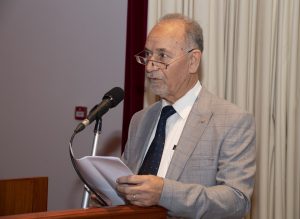NAOV 2020 KICKS OFF

The opening ceremony of the 5th he International Conference on Numerical Analysis and Optimization (NAOV 2020) was held on Monday, 6 January 2020 under the patronage of H.E. Dr. Ali bin Saud Al Bimani, the Vice Chancellor of Sultan Qaboos University (SQU). The conference, organized by the Department of Mathematics at the College of Science, SQU will continue till 9 January.
In his address, Prof. Mehiddin Al Baali, Chairman of the NAOV Conference said that this is the 5th conference in a series organized every three years since 2008. “The purpose of the conference is to bring together worldwide experts to give presentations on novel and advanced applications in their latest work in engineering, science and medicine to facilitate cross-fertilization among various key sectors of pure scientific and applied knowledge”.
He hoped that the conference would be a platform where prominent scientists, worldwide experts and active researchers gather and meet to stimulate the communication of new innovative ideas and knowledge on new scientific methodologies, promote scientific exchange and discuss possibilities of further cooperation, networking and promotion of mobility of senior and young researchers and research students.
Prof. Ahmed Al Rawas, Dean of the College of Science, said that the College encourages this conference as it brings together experts in numerical analysis and optimization from different parts of the world. The conference features 24 invited speakers and 43 contributed speakers from 27 countries across the world. 18 presentations are from different higher educational institutions in Oman.
 During the opening ceremony, Prof. Des Higham from the School of Mathematics at the University of Edinburgh gave a brief talk about eh history of numerical analysis and optimization. “Numerical analysis is the study of algorithms that use numerical for the problems of mathematical analysis. This branch of mathematics is applied all fields of engineering and the physical sciences, in life sciences, medicine, and so on. He observed that the growth in computing power has revolutionized the use of realistic mathematical models in science and engineering, and subtle numerical analysis is required to implement these detailed models of the world. Prof. Des Higham concluded his talk by saying that better, faster and more robust methods are required in future for the applications of numerical analysis in areas including cyber security, ethics, personalized healthcare, quantum technologies etc. “Numerical analysis finds applications in areas such as data science, deep learning, machine learning and uncertainty quantification”, he noted.
During the opening ceremony, Prof. Des Higham from the School of Mathematics at the University of Edinburgh gave a brief talk about eh history of numerical analysis and optimization. “Numerical analysis is the study of algorithms that use numerical for the problems of mathematical analysis. This branch of mathematics is applied all fields of engineering and the physical sciences, in life sciences, medicine, and so on. He observed that the growth in computing power has revolutionized the use of realistic mathematical models in science and engineering, and subtle numerical analysis is required to implement these detailed models of the world. Prof. Des Higham concluded his talk by saying that better, faster and more robust methods are required in future for the applications of numerical analysis in areas including cyber security, ethics, personalized healthcare, quantum technologies etc. “Numerical analysis finds applications in areas such as data science, deep learning, machine learning and uncertainty quantification”, he noted.
